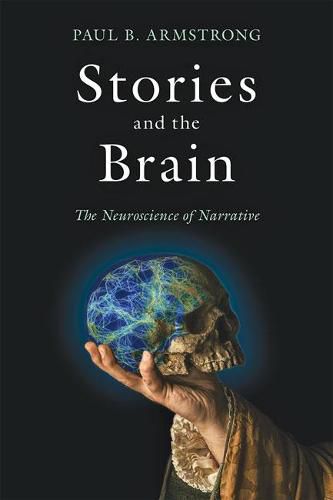Readings Newsletter
Become a Readings Member to make your shopping experience even easier.
Sign in or sign up for free!
You’re not far away from qualifying for FREE standard shipping within Australia
You’ve qualified for FREE standard shipping within Australia
The cart is loading…






This book explains how the brain interacts with the social world-and why stories matter.
How do our brains enable us to tell and follow stories? And how do stories affect our minds? In Stories and the Brain, Paul B. Armstrong analyzes the cognitive processes involved in constructing and exchanging stories, exploring their role in the neurobiology of mental functioning.
Armstrong argues that the ways in which stories order events in time, imitate actions, and relate our experiences to others’ lives are correlated to cortical processes of temporal binding, the circuit between action and perception, and the mirroring operations underlying embodied intersubjectivity. He reveals how recent neuroscientific findings about how the brain works-how it assembles neuronal syntheses without a central controller-illuminate cognitive processes involving time, action, and self-other relations that are central to narrative.
An extension of his previous book, How Literature Plays with the Brain, this new study applies Armstrong’s analysis of the cognitive value of aesthetic harmony and dissonance to narrative. Armstrong explains how narratives help the brain negotiate the neverending conflict between its need for pattern, synthesis, and constancy and its need for flexibility, adaptability, and openness to change. The neuroscience of these interactions is part of the reason stories give shape to our lives even as our lives give rise to stories.
Taking up the age-old question of what our ability to tell stories reveals about language and the mind, this truly interdisciplinary project should be of interest to humanists and cognitive scientists alike.
$9.00 standard shipping within Australia
FREE standard shipping within Australia for orders over $100.00
Express & International shipping calculated at checkout
This book explains how the brain interacts with the social world-and why stories matter.
How do our brains enable us to tell and follow stories? And how do stories affect our minds? In Stories and the Brain, Paul B. Armstrong analyzes the cognitive processes involved in constructing and exchanging stories, exploring their role in the neurobiology of mental functioning.
Armstrong argues that the ways in which stories order events in time, imitate actions, and relate our experiences to others’ lives are correlated to cortical processes of temporal binding, the circuit between action and perception, and the mirroring operations underlying embodied intersubjectivity. He reveals how recent neuroscientific findings about how the brain works-how it assembles neuronal syntheses without a central controller-illuminate cognitive processes involving time, action, and self-other relations that are central to narrative.
An extension of his previous book, How Literature Plays with the Brain, this new study applies Armstrong’s analysis of the cognitive value of aesthetic harmony and dissonance to narrative. Armstrong explains how narratives help the brain negotiate the neverending conflict between its need for pattern, synthesis, and constancy and its need for flexibility, adaptability, and openness to change. The neuroscience of these interactions is part of the reason stories give shape to our lives even as our lives give rise to stories.
Taking up the age-old question of what our ability to tell stories reveals about language and the mind, this truly interdisciplinary project should be of interest to humanists and cognitive scientists alike.